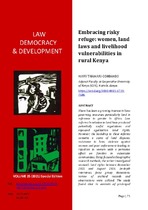Embracing risky refuge: Women, land laws and livelihood vulnerabilities in rural Kenya
Abstract
There has been a growing interest in laws governing resources particularly land in reference to gender in Africa. Law reforms in relation to land have produced potentially useful regulations and espoused egalitarian land rights. However, the backdrop to these reforms contains a scene of land disputes, resistance to laws, violence against women and poor enforcement leading to injustices to women with a pervasive effect on families in vulnerable communities. Using focused ethnographic research methods, the writer investigated women's land rights between November 2015 and August 2016. In-depth interviews, focus group discussions, review of archival records and observations were utilised. The study found that in contexts of prolonged livelihood vulnerabilities, as in the case of the Luo people of south-western Kenya, women seeking refuge from livelihood difficulties employ two strategies to anchor their security. They migrate from marital homes to fishing villages and also lay claim to marital land, which is held by men according to customary laws. These strategies produce social dilemmas and risky manoeuvering. Statutory land laws that are enacted to mitigate land related conflicts undermine the existing customary land laws that advantage men. Therefore, women's land claims, and statutory land laws that espouse equality in land ownership, destabilise men's sense of masculinity. By drawing on the experiences of women, I show the intersection between land laws, enduring injustices and gender relations in a context of strained livelihoods.

